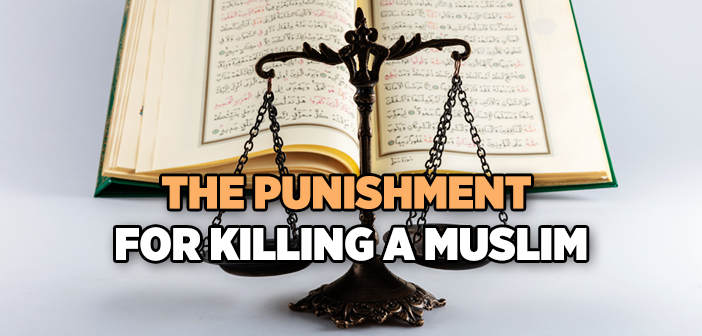What is the punishment for killing a muslim?
Before setting out from Medina, the Noble Messenger -upon him blessings and peace- had sent a small unit under Abu Qatadah towards Najd, as a maneuver to conceal the ultimate destination of the Muslim army. When the unit reached Izam, they were met with by a man by the name of Amir ibn Adbat, who greeting the Muslim unit and saying the word of shahadah, informed them he had become Muslim. But owing to a past dispute he had with Amir, Muhallim ibn Jassamah, from the Muslim cavalry unit, claimed that Amir was only a pretender and killed him, seizing his belongings as spoils in the process.
The Blessed Prophet -upon him blessings and peace- had just completed his zuhr salat in the Hunayn Valley and was sitting under a tree amid his Companions when Abu Qatadah and his unit eventually returned from Najd. The incident was made known to him, sparking at the instant the below ayah:
“O you who believe! When you go to war in Allah’s way, make investigation, and do not say to any one who offers you peace: You are not a believer. Do you seek goods of this world’s life! But with Allah there are abundant gains; you too were such before, then Allah conferred a benefit on you; therefore make investigation; surely Allah is aware of what you do.” (an-Nisa, 94)
Shortly thereafter, Amir’s family arrived to charge Muhallim with murder. After a lengthy trial, with the approval of Amir’s family, the Blessed Prophet -upon him blessings and peace- sentenced Muhallim to a payment of blood-money to the victim’s family.
“So you killed Amir even though he told you he was a Muslim…” then reproved the Blessed Prophet -upon him blessings and peace-.
Muhallim could only say, “Pray for my forgiveness, Messenger of Allah!” which was practically an admission that he had committed the crime, knowingly. Having taken the life of an innocent person in spite of him being a Muslim, Muhallim’s crime was not of a kind that could be easily forgiven. The slightest show of tolerance in this regard would have made it impossible to curb future crimes of the kind. The Prophet of Mercy -upon him blessings and peace- therefore refused Muhallim’s request for a prayer of forgiveness and even stated, “May Allah not forgive you!”[1]
Afflicted with the anger of the Blessed Prophet -upon him blessings and peace-, Muhallim went home where he remined in hiding. He eventually died from excess grief a week later. When his family tried burying him, the ground pushed his corpse back out. No matter how many times they tried, the same happened each time. Helpless and astounded, they came to the Prophet of Allah -upon him blessings and peace- and explained him their dilemma.
“The earth has accepted many others worse than him in her bosom”, said the Blessed Prophet -upon him blessings and peace-, “but Allah wishes to teach you a lesson and the value of La ilaha ill-Allah!” He then advised them to bury Muhallim once again by this time placing stones on his grave. (Ahmad, V, 112; Ibn Majah, Fitan, 1; Ibn Hisham, IV, 302; Waqidi, III, 919)
The Blessed Prophet -upon him blessings and peace- acted this way in order to stress the severity of violating the right and honor of La ilaha ill-Allah and of another Muslim, to show how terrible a sin it is to kill a fellow Muslim for the mere sake of worldly goods and to thereby emphatically deter others from committing like crimes.
The incident proves that all people who profess the word of tawhid are to be regarded as Muslim. Unless a person blatantly shows his disbelief, it is impermissible to doubt his iman.
The incident again shows just how important it is for Muslims to look at the external facts of the matter when passing judgment on it. Considering there is always an element of deception even when passing judgment based on external facts, had humans been given the privilege of basing their verdicts on inner motives, the exact determining of which is a sheer impossibility, they would not have been able to steer clear from committing many an injustice owing to their subjective interpretations.
Another reason behind the obligation to pass judgment based on external facts is to prevent certain people, from clinging onto excuses like ‘look at my heart, not my deeds’ to justify their flawed deeds and shortcomings. This tactic frequently resorted to in this day and age is instantly annulled by the above principle instated by Islam and by the practice of the Prophet of Allah -upon him blessings and peace-. Passing judgment according to external facts may seem to provide a temporary loop hole for hypocrites by giving them an opportunity to conceal their inner hypocrisy with outward deeds; still, it provides a barrier against trying to implement justice with evidence based on guesswork, rather than conviction.
[1] The Companion who has narrated the hadith says, “Amongst ourselves, we used to say that ‘the Messenger of Allah prayed for his forgiveness but acted that way to express the gravity of what Muhallim had done and to prevent people from killing each other.’” (Ahmad, V, 112; Ibn Hisham, IV, 304)
Source: Osman Nuri Topbaş, The Prophet Muhammed Mustafa the Elect II, Erkam Publications





